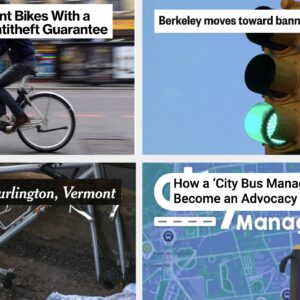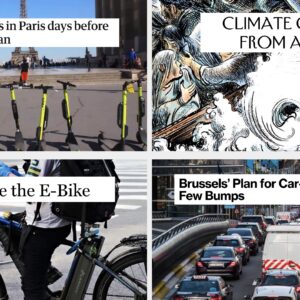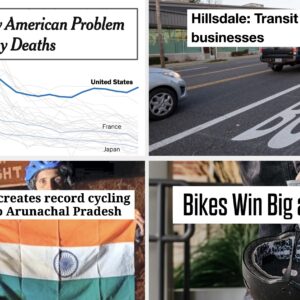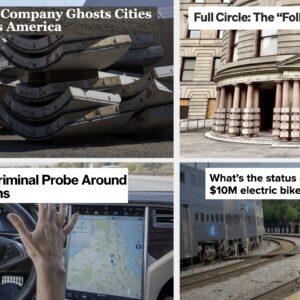Happy new year, everyone!
– There has been a lot of editorial page pontification in the last week about what our cities’ transportation policies should be in 2009. Here are a handful:
- The Hartford Courant, which I’ve been reading, wants better public transportation and restoration of historic train stations.
A province in Rwanda has banned bicycle use; Maryland police are surveilling a bicycle group
- The Toronto Star calls for a transformation of the city with more carfree streets and better walkability.
- The Jakarta Post (which doesn’t have permanent links to their stories) says “Let’s be friendlier in 2009!” and asks for more carfree spaces and safer streets.
– New Portland Commissioner Amanda Fritz has been given the job of “river czar” and the task of overseeing the cleanup of the Willamette and the development of its various functions, including transportation.
– Chris Smith at PortlandTransport.com has looked over the draft of the region’s new transportation priorities document, and found it lacking in vision for sustainable transportation.
– The Willamette Week called up a few Portland bike shops to ask about they’re doing in the economic downturn.
– The New York Times writes that “A surge in bicyclists appears to be waiting,” and interviews a number of retailers — including Jay Graves of Portland’s own Bike Gallery — about how low gas prices and the recession are hitting their business, and ridership.
– Bikes are becoming popular again with China’s elite, as a fashion statement as well as a way to get around.
– The New York Times has rounded up some differing opinions about new bike lanes in Brooklyn.
– A province in Rwanda has banned bicycle use, and locals are at a loss as to how to get themselves and their goods around.
– DC’s Washcycle blog has turned up a Washington Post story about various groups that Maryland police have labeled “terrorists,” including an unnamed group dedicated to “establishing bike lanes.”
– And finally, a reader sent in this link to an artist’s vision of incredibly obese cars.
As always, feel free to discuss any of these items or post your own in the comments.
I’m still on my East Coast Tour, and will have two more Mondays on the road.







Thanks for reading.
BikePortland has served this community with independent community journalism since 2005. We rely on subscriptions from readers like you to survive. Your financial support is vital in keeping this valuable resource alive and well.
Please subscribe today to strengthen and expand our work.
Fat cars… so disgusting. I wonder if there’s a CMI (Car Mass Index) calculator out there on the web…
Was I sleeping or I did not see anything written about the green boxes article in National Geographic?
Meanwhile, my neighborhood newletter mentioned a project to improve traffic flow on 181st between Halsey and Sandy by installing a computurized signal and eliminating a crosswalk.
Eastsiders standing in the center turn lane with stroller and kids in tow can attest to there being far too many crosswalks.
The article about the banning of bikes in Rwanda is thought provoking; repercussions of a changing society, the struggle of poor people to make a living, failure of government to know about and accommodate the needs of the people it serves.
Re; resurgence of popularity of bikes in China: Good to hear Chinese citizens haven’t forgotten the value of the bike as transportation, though did they ever really? Sure, there has been an embrace of motor vehicles as a sign of rising stature, but what I’ve been able to gather, is that certain actions of China’s government directly put the damper on bike use in areas where use of the bike for transportation was very much an interest of the public. Maybe this most recent developing interest will help to reverse the governments trend against bikes as transportation.
Yesterday, I read the story about the bike lanes in Brooklyn. The most severe objections represented in the comments were from neighborhood residents that felt they lost parking spots due to lane installation. The city responded saying new parking was being elsewhere in the neighborhood. The situation in Brooklyn has me wondering about the city’s involvement of the neighborhood in the planning process. Sounds as though too many neighborhood people are not being taken by surprise by the changes, due to not having been adequately informed about them in advance. I wonder if that might be part of the reason SF has had trouble implementing its own bike plan.
Pardon me: “Sounds as though too many neighborhood people are not being taken by surprise by the changes…”
Scratch “not” from the above.
the whole idea of calling an expert or person of power in any given subject a ‘czar’ is incredibly stupid. Many thanks to you if you could you please stop propagating this idiocy, Jonathan.